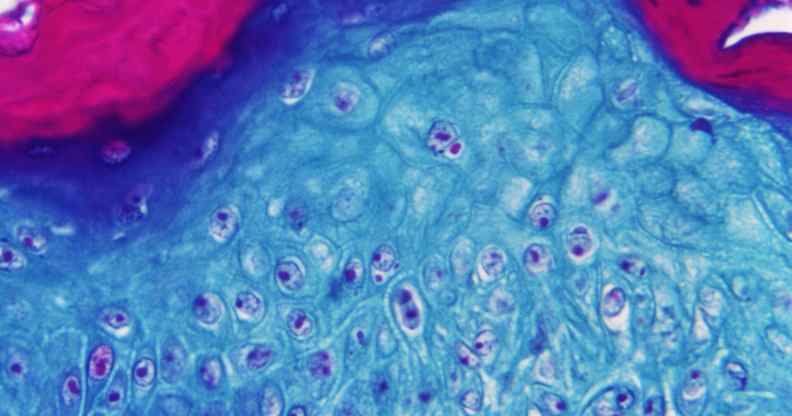Monkeypox could soon spread beyond gay and bi men, World Health Organization warns

The monkeypox infection has been detected largely among gay and bisexual men. (Smith Collection/Gado/Getty)
An expert at the World Health Organization (WHO) has warned that the monkeypox outbreak affecting gay and bisexual men could be a “canary in the mine” for vulnerable people.
While experts have explained that monkeypox is not a so-called “gay disease” and anybody can contract it, the virus has proved to be more prevalent among gay and bisexual men, who will be prioritised in a vaccine roll-out.
However, the WHO has now warned that monkeypox could spread well beyond the LGBTQ+ community in the future, and could affect vulnerable people, such as those with weakened immune systems.
Dr Catherine Smallwood, senior emergency officer at WHO, told CNBC: “At the moment, cases continue to be reported among men who have sex with men for the most part, but we should not expect that to remain as such.
“This really might be the canary in the mine that’s alerting to us a new disease threat that could spread to other groups.
“If it does spread to other groups – particularly to people who are vulnerable to severe monkeypox disease, which we know there are certain groups that are more prone to severe illness – then we might see increased public health impact.”
With the tools we have right now, we can stop #monkeypox transmission and bring this outbreak under control. It’s essential that all countries work closely with affected communities to adopt measures that protect their health, human rights and dignity.pic.twitter.com/DqyvRtB8w2
— Tedros Adhanom Ghebreyesus (@DrTedros) July 23, 2022
The smallpox vaccine Imvanex is currently being used in the UK to help prevent monkeypox, which WHO claims has proved to be about 85 per cent effective in preventing the virus.
People eligible for vaccination include gay and bisexual men and other men who have sex with men, people who may be exposed to monkeypox at work (for example those who work at sexual health clinics), or those who have been exposed to the virus.
Dr Smallwood, however, said “we don’t have full information on how effective and how efficacious these vaccines are against monkeypox”.
She added: “We need to be able to be confident that the countermeasures that are available and potentially accessible are scaled up, and that we have the knowledge that we need to be really confident in their use.”
On Saturday (23 July), the World Health Organization (WHO) declared the growing monkeypox outbreak a global health emergency after a surge in cases worldwide.
There have been 16,015 monkeypox cases globally with 4,132 cases reported in the past week, according to WHO data. So far, there have been five deaths linked to the virus.
Steve Russell, NHS director of vaccinations, said in a statement: “The NHS is now scaling up its plans to get people vaccinated, particularly in London, thanks to the efforts of staff who are working hard to help stop onward spread, in line with UKHSA advice.
“Thousands more people will be invited very shortly with the number of clinics expanded too, and as we have done with the most successful COVID vaccination programme in history, the NHS will leave no stone unturned in ensuring everyone who is eligible can get protected.
“We are asking people to wait to be contacted and to come forward at the earliest opportunity possible when invited to get vaccinated.”

